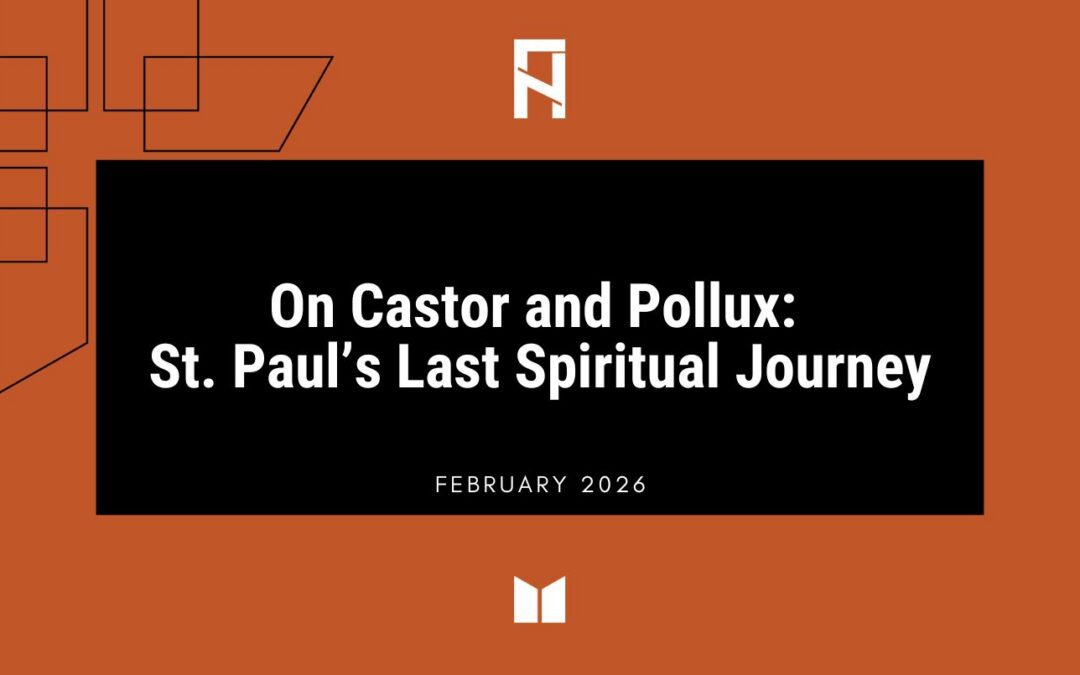As men attempt to navigate life, their questions are numerous, deep, and complex. Like Timothy needed Paul, men in search of direction need someone more experienced to guide them. But crucially, they also need a map, and it’s at our fingertips.

By Patrick Morley
Founder & Executive Chairman
Winter Park, Florida
Who is God? What is He like? Are we able to know Him personally? If so, how?
How do I become a godly man, husband, or father? How do I find work that satisfies and honors God? How should I handle money? What kind of man does God want me to become in my character? What should I prioritize and value? How am I supposed to talk to other people about Jesus?
We know from experience that men are asking these questions—and many others.
Greg, one of our Area Directors with a pastoral ministry background shared:
“I am burdened by the utter lostness and confusion I see within so many men—and younger men especially—as they attempt to decipher and navigate life. I used to be one of them. Just as two men did for me, I now want to strategically pour into the generations behind me.”
We have been focusing our recent efforts on how to best help you just do that—through the lens of Paul and Timothy. In the same way that Timothy needed Paul, men who are searching for direction and truth need someone to guide them—a spiritual father of sorts to lead them on the journey.
But crucially, they also need a map.
Map for the Soul
Those questions that men are asking? We’d be left to guess at the answers if not for one thing: the Bible.
When we experience relational difficulties, doubts, conflicting desires, suffering, or confusion, the scriptures direct us. The Bible is the map for the soul, and without it, we aren’t making disciples.
It’s like enlisting a man in the Army and issuing him a rifle, but not teaching him how to clean and shoot. On the day of battle, he’s defenseless; he’s never learned to fight.
[click_to_tweet tweet=”The Bible is the map for the soul, and without it, we aren’t making disciples.” quote=”The Bible is the map for the soul, and without it, we aren’t making disciples.”]
Just as we’ve written here on the blog, when God leads you to another man who is looking for guidance, we want you to build the friendship, invest time, make sacrifices, and share your personal experiences—both the successes and failures—as you listen to theirs.
But in Paul’s final charge to Timothy, he makes one thing crystal clear: the truth and wisdom in the Bible underpins and permeates the entire discipleship process.
Is the Bible Still Relevant?
I can assure you that the vast majority of men are wondering, Is the Bible actually relevant? This is especially true for men in their 20s and 30s. And there are good reasons for that.
In the early 1980s, a futurist named Buckminster Fuller wrote about what he called the “knowledge-doubling curve” in his book Critical Path. He made the case that up until the year 1900, all human knowledge was doubling about every 100 years.
But during the 1900s, there was an incredible acceleration of knowledge. At the time of publication, Fuller estimated that knowledge was now doubling every 12 months. Then in 2013, IBM predicted that by 2020 all human knowledge would double every 12 hours.
Consider this. As Patrick Morley, I have my life experiences, formal and informal education, and community to form a base of knowledge. But if I pull out my smart phone, I have instant access to any information about any subject anywhere in the world at any time.
There is this incredible amount of information—far more than humans are even capable of absorbing. So it makes sense that men are asking, “Is the information in this ancient, archaic book written between 2000 and 3500 years ago still relevant?”
The question is based on an incorrect premise though, and I believe that premise is one of the most powerful deceptions from the enemy. It’s that things, and more importantly, people, are so different now than they have ever been before. And because of how different things are, not only is the Bible irrelevant, but the differences between the generations form too wide a divide to overcome.
While the current cultural issues may change, the truth is our similarities are profound. In fact, our similarities dwarf our differences. And the Bible demonstrates it.
We find in its stories and letters that the core affections of the human heart are the same today as they were thousands of years ago when recorded history began.
[click_to_tweet tweet=”The core affections of the human heart are the same today as they were thousands of years ago.” quote=”The core affections of the human heart are the same today as they were thousands of years ago.”]
That’s why a man—whether he’s 18 or 80—can read the book of Ecclesiastes or the Sermon on the Mount in the year 2022 and feel like it’s speaking directly to him.
Hebrews 4:12 states the experience like this:
For the word of God is living and active, sharper than any two-edged sword, piercing to the division of soul and of spirit, of joints and of marrow, and discerning the thoughts and intentions of the heart.
Yes, the Bible is still relevant, and it serves as a map for the soul.
Paul’s Discipleship Process
In just four short verses found in 2 Timothy 3:14-17, we see Paul’s process for making disciples—to call, equip, and send men just as Timothy was called, equipped, and sent. Central to it all is the Bible.
1) Call men to live in Christ.
But as for you, continue in what you have learned and have firmly believed, knowing from whom you learned it and how from childhood you have been acquainted with the sacred writings, which are able to make you wise for salvation through faith in Christ Jesus. (2 Timothy 3:14-15)
Calling men to live in Christ is the call to salvation—to eternal life—and it’s the first part of the process. Here, Paul is telling Timothy to abide in the things that he has believed from the scriptures, because the scriptures are able to make him wise for salvation.
When I consider things such as the size of the observable universe and how our planet is essentially like a speck of dust in it, I’m flooded with perspective. I’m not even a speck of dust. The fact is our great great grandchildren likely won’t remember our names. So if we aren’t wise for eternal salvation, then we are the least wise men in the world.
[click_to_tweet tweet=”If we aren’t wise for eternal salvation, then we are the least wise men in the world.” quote=”If we aren’t wise for eternal salvation, then we are the least wise men in the world.”]
But if you live in Christ and continue in the scriptures, you are infinitely wiser than the smartest man in the world who doesn’t. In 1 Corinthians 1:25, Paul writes, “For the foolishness of God is wiser than human wisdom, and the weakness of God is stronger than human strength.”
If you want to be wise for salvation through faith in Christ Jesus, the Bible is your map.
2) Equip men to live like Christ.
Continuing in the text, Paul writes:
All Scripture is breathed out by God and profitable for teaching, for reproof, for correction, and for training in righteousness, that the man of God may be complete… (2 Timothy 3:16-17a)
When Paul says that Scripture is “breathed out by God,” he is saying that God inspired human authors with His very thoughts, and He gave them the agency to put those thoughts into human words.
This human agency is one of the reasons that people question the reliability of the Bible, and therefore, it’s relevance. But nothing could be further from the truth.
[click_to_tweet tweet=”God inspired human authors with His very thoughts, and He gave them the agency to put those thoughts into human words.” quote=”God inspired human authors with His very thoughts, and He gave them the agency to put those thoughts into human words.”]
Think about all the different languages in the world today. The demand that every single word be interpreted or rendered in a particular way is unreasonable. For example, many words in one language don’t even have an equivalent in another language. You see this if you ever watch movies or shows with subtitles; certain words, titles, ideas, and idioms don’t have any equivalent in your language, so the translations diverge.
Furthermore, humans experience events differently. Even the four gospel writers have nuanced differences in their accounts. But there is no distinction from one writer to another when it comes to the thoughts that God wanted to get across.
I’m halfway through my 35th year reading the entire Bible, and I am more amazed today than ever by the continuity of the scriptures—how it all fits together. Is there still mystery? Yes, on every page. But I’m not going to let the 5% that I can’t figure out nullify the 95% that is absolutely crystal clear.
All scripture is breathed out by God and profitable for teaching, for reproof, for correction, and for training in righteousness so that we may be complete. It’s the refining process of discipleship.
Through the scriptures, then, we are called to live in Christ (salvation, abiding), and then we are equipped to live like Christ (growth, transformation). And through the scriptures, we can call and equip others.
3) Send Men to Live for Christ
The third part of the process of making disciples is sending men to live for Christ (love, good deeds):
…equipped for every good work. (2 Timothy 3:17b, emphasis added)
By abiding in Christ and knowing the scriptures, we are equipped for every good work and sent to do everything in love.
Jesus often spoke about this as evidence of discipleship: “By this everyone will know that you are my disciples, if you love one another” (John 13:35), and “This is to my Father’s glory, that you bear much fruit, showing yourselves to be my disciples” (John 15:8).
But the human heart is deceitful above all things (Jeremiah 17:9), and we don’t always know what to do in our interactions with others. We must go to the Bible, then, for our understanding of what constitutes good works, valuable service, and even love itself.
Whether we are going or sending, following the map we’ve been given is key to the discipleship process.
THE BIG IDEA: The process for making disciples is to call, equip, and send men, and central to it all is the Bible.
Taking Action
When we look at the arc of what Paul has been teaching and reminding Timothy of in this letter, we see is a man seasoned with experience. He has been through good and bad times.
He started out as someone who hated the king of kings and those who followed Him, until he had the core affections of his heart radically transformed by Christ. Then he spent the rest of his life helping people understand the process that he had gone through and go through it themselves. In particular, he identified Timothy as someone who was well worth making a special investment in, and he did.
Ask yourself, “Where am I in this process? Do I still need to be called? Do I need equipped? Do I need to be sent? Or am I ready to help another man be called, equipped, and sent by making a special investment in him?”
If it’s the latter, what holds you back from taking action?
If it’s uncertainty about how to do this well—or of what healthy discipleship looks like—we will be releasing further, comprehensive training in the coming months and will keep you updated. But if you know the scriptures, you’re already more qualified than you realize.
There’s a desperate need for the generations after you to have not just a guide, but a map for the soul. With it, brother, you’re wiser than the smartest man without it. And you have it at your fingertips. So be encouraged—and act.
♦♦♦
[vc_widget_sidebar sidebar_id=”businesslounge-free-2″]






